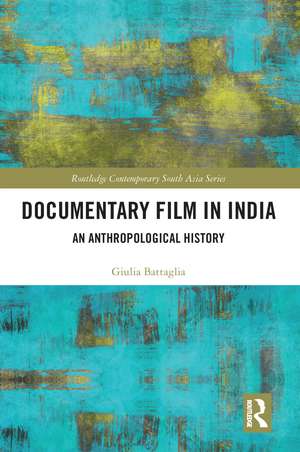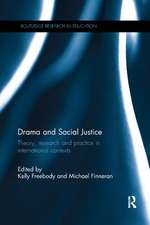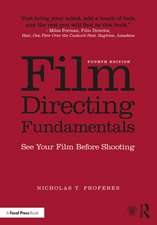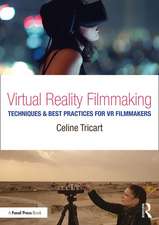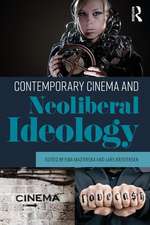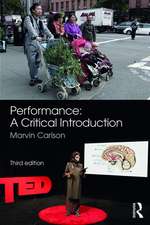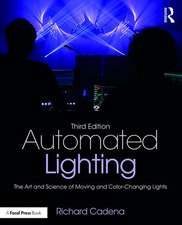Documentary Film in India: An Anthropological History: Routledge Contemporary South Asia Series
Autor Giulia Battagliaen Limba Engleză Hardback – 30 noi 2017
Grounded in anthropological fieldwork and archival research and adopting Foucault’s concept of ‘effective history’, this work searches for points of origin that creates ruptures and deviations taking distance from conventional ways of writing film histories. Rather than presenting a univocal set of arguments and conclusions about changes or new developments of film techniques, the originality of the book is in offering an open structure (or an open archive) to enable the reader to engage with mechanisms of creation, engagement and participation in film and art practices at large. In adopting this form, the book conceptualises ‘Anthropology’ as also an art practice, interested, through its theoretico-methodological approach, in creating an open archive of engagement rather than a representation of a distant ‘other’. Similarly, documentary filmmaking in India is seen as primarily a process of creation based on engagement and participation rather than a practice interested in representing an objective reality.
Proposing an innovative way of perceiving the growth of the documentary film genre in the subcontinent, this book will be of interest to film historians and specialists in Indian cinema(s) as well as academics in the field of anthropology of art, media and visual practices and Asian media studies.
| Toate formatele și edițiile | Preț | Express |
|---|---|---|
| Paperback (1) | 272.50 lei 6-8 săpt. | |
| Taylor & Francis – 12 dec 2019 | 272.50 lei 6-8 săpt. | |
| Hardback (1) | 820.71 lei 6-8 săpt. | |
| Taylor & Francis – 30 noi 2017 | 820.71 lei 6-8 săpt. |
Din seria Routledge Contemporary South Asia Series
-
 Preț: 386.31 lei
Preț: 386.31 lei -
 Preț: 309.12 lei
Preț: 309.12 lei -
 Preț: 341.55 lei
Preț: 341.55 lei -
 Preț: 313.81 lei
Preț: 313.81 lei -
 Preț: 296.64 lei
Preț: 296.64 lei - 8%
 Preț: 389.83 lei
Preț: 389.83 lei -
 Preț: 310.08 lei
Preț: 310.08 lei -
 Preț: 200.66 lei
Preț: 200.66 lei - 9%
 Preț: 1001.47 lei
Preț: 1001.47 lei - 18%
 Preț: 1056.00 lei
Preț: 1056.00 lei - 18%
 Preț: 1068.52 lei
Preț: 1068.52 lei - 18%
 Preț: 1060.87 lei
Preț: 1060.87 lei - 18%
 Preț: 1060.87 lei
Preț: 1060.87 lei - 18%
 Preț: 1060.52 lei
Preț: 1060.52 lei - 26%
 Preț: 848.40 lei
Preț: 848.40 lei - 18%
 Preț: 1059.48 lei
Preț: 1059.48 lei - 18%
 Preț: 1061.93 lei
Preț: 1061.93 lei - 18%
 Preț: 1057.05 lei
Preț: 1057.05 lei - 18%
 Preț: 1062.98 lei
Preț: 1062.98 lei - 18%
 Preț: 1054.97 lei
Preț: 1054.97 lei - 18%
 Preț: 1058.79 lei
Preț: 1058.79 lei - 18%
 Preț: 1057.09 lei
Preț: 1057.09 lei - 18%
 Preț: 705.87 lei
Preț: 705.87 lei - 18%
 Preț: 1054.97 lei
Preț: 1054.97 lei - 18%
 Preț: 1109.42 lei
Preț: 1109.42 lei - 26%
 Preț: 846.42 lei
Preț: 846.42 lei - 18%
 Preț: 1054.71 lei
Preț: 1054.71 lei - 18%
 Preț: 1057.75 lei
Preț: 1057.75 lei - 18%
 Preț: 1062.98 lei
Preț: 1062.98 lei - 26%
 Preț: 822.36 lei
Preț: 822.36 lei - 26%
 Preț: 848.15 lei
Preț: 848.15 lei - 18%
 Preț: 1053.92 lei
Preț: 1053.92 lei - 18%
 Preț: 703.79 lei
Preț: 703.79 lei - 18%
 Preț: 1058.79 lei
Preț: 1058.79 lei - 18%
 Preț: 1062.98 lei
Preț: 1062.98 lei - 18%
 Preț: 1057.75 lei
Preț: 1057.75 lei - 18%
 Preț: 1060.87 lei
Preț: 1060.87 lei - 18%
 Preț: 1057.40 lei
Preț: 1057.40 lei - 18%
 Preț: 1056.56 lei
Preț: 1056.56 lei - 18%
 Preț: 1169.45 lei
Preț: 1169.45 lei - 25%
 Preț: 823.63 lei
Preț: 823.63 lei - 18%
 Preț: 1059.48 lei
Preț: 1059.48 lei -
 Preț: 378.09 lei
Preț: 378.09 lei - 25%
 Preț: 823.63 lei
Preț: 823.63 lei - 18%
 Preț: 1169.78 lei
Preț: 1169.78 lei - 18%
 Preț: 1055.51 lei
Preț: 1055.51 lei - 18%
 Preț: 1057.75 lei
Preț: 1057.75 lei - 18%
 Preț: 1227.38 lei
Preț: 1227.38 lei - 26%
 Preț: 850.37 lei
Preț: 850.37 lei
Preț: 820.71 lei
Preț vechi: 1103.24 lei
-26% Nou
Puncte Express: 1231
Preț estimativ în valută:
157.07€ • 163.55$ • 132.74£
157.07€ • 163.55$ • 132.74£
Carte tipărită la comandă
Livrare economică 11-25 martie
Preluare comenzi: 021 569.72.76
Specificații
ISBN-13: 9781138551732
ISBN-10: 1138551732
Pagini: 266
Ilustrații: 4 Line drawings, black and white; 14 Halftones, black and white; 18 Illustrations, black and white
Dimensiuni: 156 x 234 x 21 mm
Greutate: 0.5 kg
Ediția:1
Editura: Taylor & Francis
Colecția Routledge
Seria Routledge Contemporary South Asia Series
Locul publicării:Oxford, United Kingdom
ISBN-10: 1138551732
Pagini: 266
Ilustrații: 4 Line drawings, black and white; 14 Halftones, black and white; 18 Illustrations, black and white
Dimensiuni: 156 x 234 x 21 mm
Greutate: 0.5 kg
Ediția:1
Editura: Taylor & Francis
Colecția Routledge
Seria Routledge Contemporary South Asia Series
Locul publicării:Oxford, United Kingdom
Public țintă
PostgraduateCuprins
Introduction
1. History’s Fragments
2. Around the Films Division
3. The Growth of Independent Practices
4. The Advent of Video Technology
5. Articulation of Performance and Performativity
6. Film Festivals, Small Media and Online Networks
7. Sites of Cultural Activism
8. Open-ended Archives: Film, Art and Anthropology
References
1. History’s Fragments
2. Around the Films Division
3. The Growth of Independent Practices
4. The Advent of Video Technology
5. Articulation of Performance and Performativity
6. Film Festivals, Small Media and Online Networks
7. Sites of Cultural Activism
8. Open-ended Archives: Film, Art and Anthropology
References
Notă biografică
Giulia Battaglia is a researcher in anthropology of visual/art/media practices specialised in documentary film in India. Her work is interdisciplinary and draws from a range of academic fields, including visual/media anthropology, documentary studies, visual and material cultures, art and anthropology, Indian cinema, cultural studies and film history. After receiving a PhD from the School of Oriental and African Studies (SOAS), University of London, she has worked as a lecturer and researcher in various departments of anthropology, media, arts and social science as well as in cultural institutions in England and in France. At present, she lives and works in Paris in the field of anthropology, arts and media, being part of the laboratoire de recherche IRMECCEN, Université Sorbonne Nouvelle (Paris 3) and the laboratoire de recherche LAIOS/IIAC, at the École des Hautes Études en Sciences Sociales (EHESS). For the latter, she is also responsible for a funded international project between art and social science, called ‘L’invention des formes de représentation à l’ère de la mondialisation’.
Descriere
Grounded in anthropological fieldwork and archival research and adopting Foucault’s concept of ‘effective history’, it searches for points of origin that creates ruptures and deviations taking distance from conventional ways of writing film histories. Rather than presenting a univocal set of arguments and conclusions about changes or new developments of film techniques, the originality of the book is in offering an open structure (or an open archive) to enable the reader to engage with mechanisms of creation, engagement and participation in film and art practices at large.
